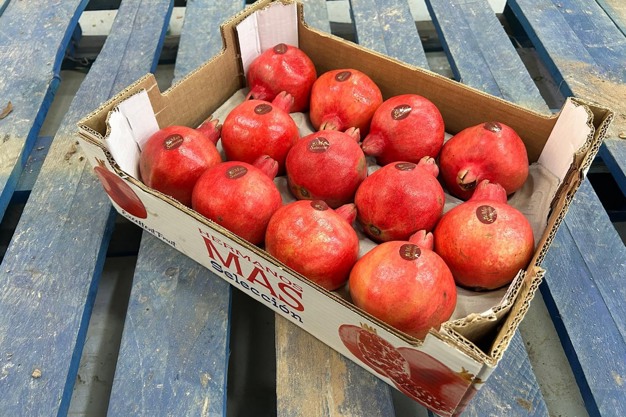The demand for Spanish pomegranates has remained high since the start of the season, which happened almost two weeks earlier than usual because of a production gap in the European markets due to the premature end of the overseas campaign.

"We started in week 32 with the Smith variety, when we usually start in week 34. This summer's heat waves have caused the pomegranates to ripen quicker and we are starting to harvest between 10 and 12 days earlier than usual," says Francisco Mas, Sales Director for Frutas y Hortalizas Mas Serrano, a pomegranate grower and exporter based in Elche, Alicante.
"The Peruvian Wonderful pomegranate season finished prematurely and the markets were empty, so the Spanish production has been welcomed with great enthusiasm and a very high demand," says Francisco Mas.

"We have been loading pomegranates non-stop for three weeks now, as for the time being, Spanish pomegranates face practically no competition. In around a month's time, sales are likely to slow down due to the arrival of pomegranates from other countries, especially Turkey and Egypt," he says.
At the moment, the company is working with the early varieties Smith, Acco and Emek, with volumes between 10 and 15% lower than last year. "As is usually the case with the extra-early varieties, the fruits are medium-sized. We'll have to wait for the harvest of the Mollar and Wonderful to start obtaining some larger sizes," he says.

According to the grower and marketer, one of the main challenges ahead of the harvest of the Mollar pomegranate, the native variety from Elche and the most representative in terms of volume on a domestic level, is the presence of the South African thrips Scirtothrips aurantii in the Valencia region. At the beginning of July, the Regional Council of Agriculture officially reported the presence of this quarantine pest.
"We don't know yet to what extent this thrips is present on the pomegranates, but we expect that presence to be significant in the province, which will mean a lower production of commercial quality fruit. We are going to have to learn to live with the pest from now on and that will mean higher production costs," says Francisco Mas.
For more information:
Francisco Mas
Fruits and Vegetables Mas Serrano, SL.
Partida Daimes, P.l. 1 N.º 96.
03294 Elche, Alicante. Spain.
Tel.: +34 965 45 70 63
[email protected]
www.masserrano.es
